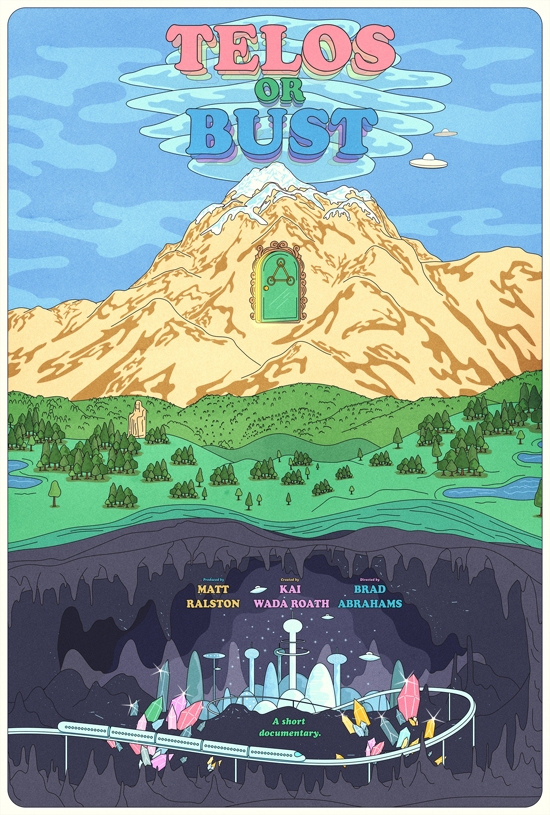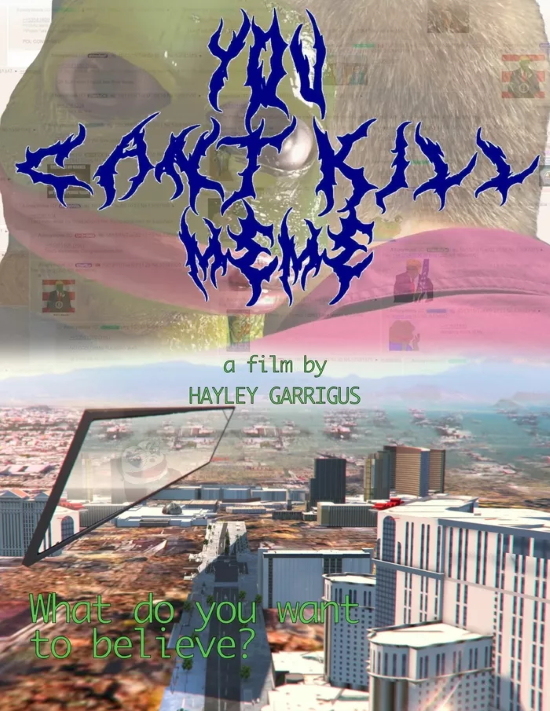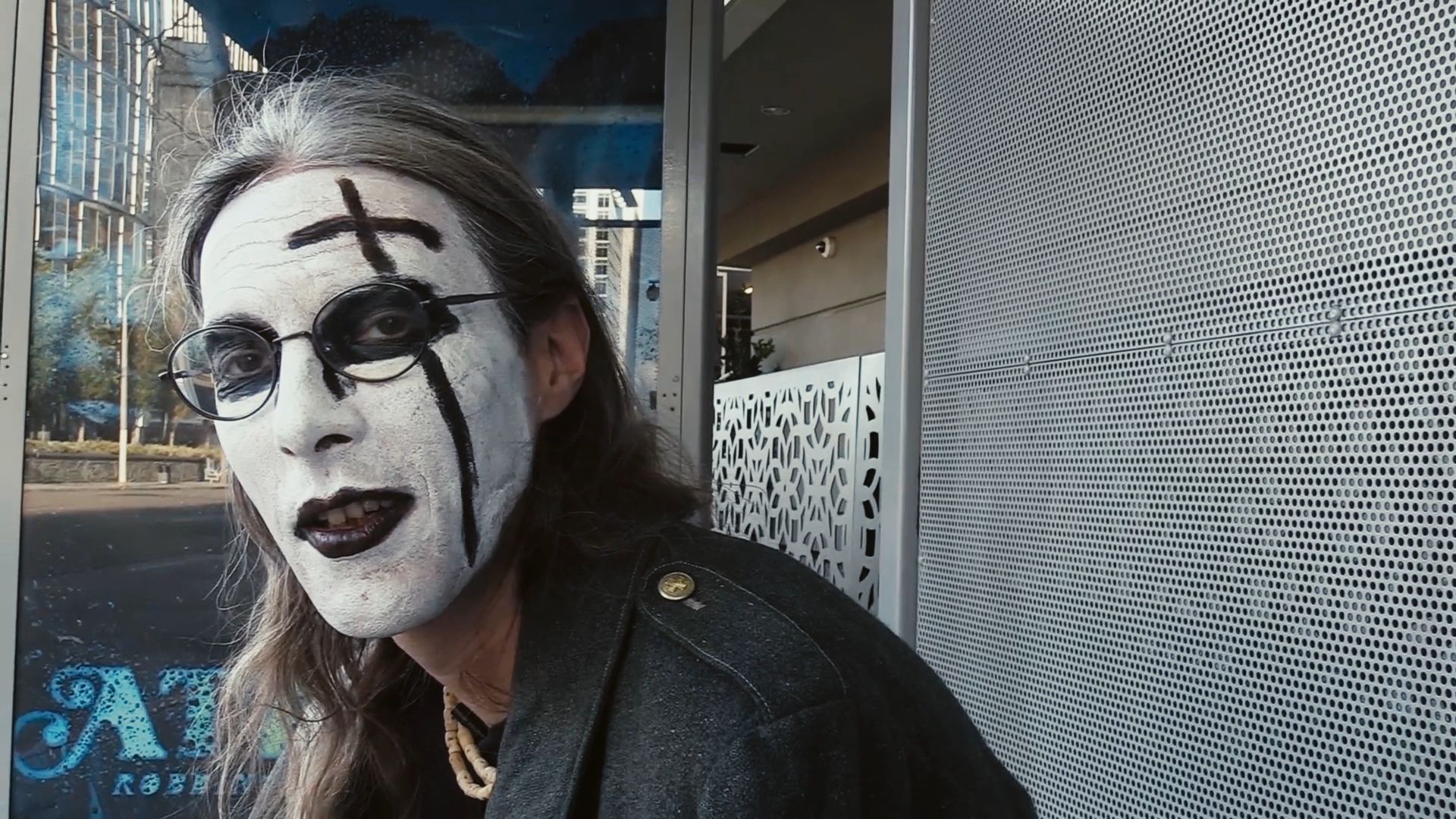Fantasia 2021, Part XXXVI: You Can’t Kill Meme
 One of the nice things about a film festival is seeing a programme of shorter films that work as a whole — pieces not intended to be complementary that happen to come along at the same time and build on each others’ themes. I have to think it takes a good critical eye for a festival programmer to notice which films speak to each other out of the many submissions they get. It’s worth praising that discernment when a bundle of shorter movies succeed in forming a coherent collective, as was the case with the set of three documentary and pseudo-documentary films anchored by the 79-minute feature You Can’t Kill Meme.
One of the nice things about a film festival is seeing a programme of shorter films that work as a whole — pieces not intended to be complementary that happen to come along at the same time and build on each others’ themes. I have to think it takes a good critical eye for a festival programmer to notice which films speak to each other out of the many submissions they get. It’s worth praising that discernment when a bundle of shorter movies succeed in forming a coherent collective, as was the case with the set of three documentary and pseudo-documentary films anchored by the 79-minute feature You Can’t Kill Meme.
First in the grouping was the 9-minute “The Truth About Hastings.” Written and directed by Dan Schneidkraut, it’s a wry satirical take on conspiracy theory and the secret symbolism underlying a nice old lady’s 93rd birthday in the town of Hastings, Nebraska. (Or, at least, I take it as satire of conspiracy theory; given the way the film develops, you could view it more seriously.) A voice-over (courtesy Amanda Day) lays out ‘coincidences’ and resonances of secret meanings underlying events, based on “firsthand survivor testimony.” There’s a good attempt at capturing the paranoiac feel of the X-Files, with big ideas about reality as a hologram, and it builds to a surprisingly psychedelic finale. It is a bit slow, and perhaps could be tightened a bit here and there, but has a strong approach.
“Telos Or Bust,” directed by US-based Canadian Brad Abrahams, is a 15-minute investigation into the New Age beliefs that have focussed on Mount Shasta, California — where, some say, ancient Lemurians have built a utopian hidden city under the mountain. It’s a charming documentary that lets its subjects talk happily about ascended gurus and crystals from other planets and so forth, while also as a film being perceptive about history and race, and out of all this making clear where the various tangled strands of story woven around Mount Shasta come from.
Abrahams braids together interviews with various residents of the area, and does a good job of building each of them up as a distinct personality and a believer in a different element of the Mount Shasta stories, along with one historian who documents the way the various stories developed and intersected. The movie’s not just about those beliefs but about the people who hold them, and part of the pleasure of the film is meeting these people — odd people, but pleasant, apparently happy, and otherwise quite well-adjusted. Abrahams is apparently hoping to use “Telos Or Bust” as an episode of a projected series called Keep Folklore Alive, about odd folklore beliefs in the modern world; it’s strong work that suggests the series would be worth watching.
 Next came You Can’t Kill Meme, a documentary by Hayley Garrigus. It’s about memetic magic, and why a group of oddballs believe that magic encoded in various internet memes affected the world and propelled Donald Trump to the presidency of the United States. Interviews, including onscreen appearances by Garrigus, establish the basic beliefs of a disparate set of people interested in memetic magic. A voiceover narration helps to tie together the sprawl of matter, ranging from politics to the occult to the history of Las Vegas.
Next came You Can’t Kill Meme, a documentary by Hayley Garrigus. It’s about memetic magic, and why a group of oddballs believe that magic encoded in various internet memes affected the world and propelled Donald Trump to the presidency of the United States. Interviews, including onscreen appearances by Garrigus, establish the basic beliefs of a disparate set of people interested in memetic magic. A voiceover narration helps to tie together the sprawl of matter, ranging from politics to the occult to the history of Las Vegas.
It begins with Pepé the frog (discussed in last year’s documentary Feels Good Man) and the connection of his iconography to the Egyptian god Kek, and goes on from there. There are extensive discussion with R. Kirk Packwood, whose 2004 book Memetic Magic: Manipulation of the Root Social Matrix and the Fabric of Reality presented the first articulation of the possible magical power of memes. There are would-be wizards with dubious aims in this film, and ‘lightworkers’ striving for the good, and a brief introduction to chaos magic. Garrigus apparently spent four years on this film, and there’s a lot of material here.
 She presents the film as an essay, not an investigative documentary. She’s not just informing us of the beliefs of the documentary subjects, but using them to put forward larger ideas about society. It is unclear, but interesting to ponder, exactly what those ideas are. Garrigus presents the film with an often low-fi technical approach (visually and aurally), and at first glance her narration appears to be direct and simple to match. But that’s not necessarily the case.
She presents the film as an essay, not an investigative documentary. She’s not just informing us of the beliefs of the documentary subjects, but using them to put forward larger ideas about society. It is unclear, but interesting to ponder, exactly what those ideas are. Garrigus presents the film with an often low-fi technical approach (visually and aurally), and at first glance her narration appears to be direct and simple to match. But that’s not necessarily the case.
In a fascinating question-and-answer period on Fantasia’s YouTube page with the filmmakers behind these three movies, Garrigus refers to the construction of a version of herself as a character. She describes the film as an anti-documentary, and observes that the narration is not simply her own reflection on the material she’s found. Instead, the development of the narrator as a character is meant to be a way to take the audience into the subject.
 It’s a good approach, but I’m not sure it works. The narrator’s politics are facile if taken literally, but it’s difficult to see how to find a deeper level to them and difficult to see how her discourse is meant to work on the audience. The voiceover engages in trite both-sides-ism of a kind that is baffling to me as an uncouth foreigner, and in its broad-brush assertions about American liberals — including a bizarre assertion that “liberal elites look down on Las Vegas” — sounds close to the alt-right subjects of the film. I note in particular a line complaining that liberals look down those without “ethics or morals;” who sound to me like by definition the sort of people one should look down on.
It’s a good approach, but I’m not sure it works. The narrator’s politics are facile if taken literally, but it’s difficult to see how to find a deeper level to them and difficult to see how her discourse is meant to work on the audience. The voiceover engages in trite both-sides-ism of a kind that is baffling to me as an uncouth foreigner, and in its broad-brush assertions about American liberals — including a bizarre assertion that “liberal elites look down on Las Vegas” — sounds close to the alt-right subjects of the film. I note in particular a line complaining that liberals look down those without “ethics or morals;” who sound to me like by definition the sort of people one should look down on.
The film also talks about the internet, a global communications network, solely in terms of its influence on the USA. The political interest of the film is limited to the US, without any reference even to, say, Brexit; never mind the non-anglophone world beyond. It’s difficult for me to see a reading of the film that credits it with the self-awareness to see this limitation. At the very least, if memetic magic is confined to the United States, it would be worth exploring why that is.
 Say this for the movie: it’s an individual creation, at least. I never knew where it was going to go next, what sort of angle it was about to take on its soi-disant magi. At any moment it might turn into, say, a discussion about the psychogeography of Las Vegas. This does not to my mind always result in successful filmmaking; narration aside, the movie doesn’t seem to know what to do with the political aspects of its subject. But it’s interesting enough often enough to work.
Say this for the movie: it’s an individual creation, at least. I never knew where it was going to go next, what sort of angle it was about to take on its soi-disant magi. At any moment it might turn into, say, a discussion about the psychogeography of Las Vegas. This does not to my mind always result in successful filmmaking; narration aside, the movie doesn’t seem to know what to do with the political aspects of its subject. But it’s interesting enough often enough to work.
What I think makes it successful for me is that Garrigus interviews a lot of idiosyncratic people, misfits and loners and would-be magicians, and without intending to send them up she allows them to come off as banal. There is an honesty in that. All these guys (most of them guys, most of them white, most of them young) claim to be exploring secret paths to power that can rewrite the world; and it’s pretty clear they’re acting out their need for power and self-assertion and attention. That banality underlies the oddity of the concepts they’re exploring: the ideas are fascinating, but the personalities are conventional.
I don’t know how much Garrigus saw that. It’s not really remarked upon in the film. But for me it’s one of the more interesting aspects of the story she’s telling. Meme magic is a way, in the minds of some young people, to make their mark on the world. To establish that they matter, that they as individuals have meaning. There’s nothing inherently wrong with that aspiration, and (to me as a skeptic, but note comments below) meme magic is among the more harmless ways to go about gratifying that desire. You Can’t Kill Meme works as an introduction to the constellation of topics it’s concerned with; as a film beyond that, it at least documents characters in a way that gets at something human. Which is worthwhile.
Find the rest of my Fantasia coverage from this and previous years here!
Matthew David Surridge is the author of “The Word of Azrael,” from Black Gate 14. You can buy collections of his essays on fantasy novels here and here. His Patreon, hosting a short fiction project based around the lore within a Victorian Book of Days, is here. You can find him on Facebook, or follow his Twitter account, Fell_Gard.
First off, the review is well written and the reviewer took the time to do the extra research that all reviewers should do. I applaud that. I found the review pretty reasonable – even if I don’t share the opinions of the reviewer in most cases.
I was a bit bothered by a couple of things though. How can an “idiosyncratic” (adjective: relating to idiosyncrasy; peculiar or individual) cast of characters in the film be “banal” (adjective: so lacking in originality as to be obvious and boring)? Logical contradictions bring out the fallacy in reviews or any form of writing or argument. Even if I were to agree that the characters were “banal” in their attempt to make their mark on the world with meme magic (I wouldn’t agree with that at all, though), your assertion that meme magic “meme magic is among the more harmless ways to go about gratifying that desire [for self worth and meaning]” really misses the very important point that it was meme magic (read: propaganda on mass scale distributed by a horde of disaffected and alienated youth and adults) that pushed the election in Trump’s favor. Meme magic is hardly ‘harmless’. It’s the newest most modern form of mass propaganda. Propaganda can be very effective at transforming societies by transforming the beliefs of the masses.
While I can understand that most people who watch the film who don’t believe in “magic” or the occult will still not believe in magic or the occult after they see the film, if you were to do some deep research on some of the characters in the film you will discover that their occult beliefs, systems, and writings are very deep and very complex. The occult runs very deep in meme magic… and it’s precisely the fact that the mainstream does not believe in the power of meme magic that allowed meme magic to be so successful by “passing under the radar” of the repressive and oppressive forces of society.
People trying to mark their mark with meme magic or no different from people trying to make their mark on the world in any other area – except that the meme magic crowd DID make their mark on the world by getting Trump elected. There’s nothing banal about any person who actively tries to make their mark on the world. The banal people are the people who don’t try.
Have a good day.
Hi, Rick. Thank you for the reasoned comment! I appreciate the reaction, and the careful reading. I’m sorry for taking so long to respond myself. (And sorry for going on at length, but you raise some good points, and I wanted to address them in full.)
To expand a bit first on idiosyncratic versus banal: I found the people interviewed in the movie, as they came across onscreen, idiosyncratic in their personal comportment and particularly in the philosophies they espoused. They had idiosyncratic ideas, and lived in idiosyncratic ways. But I thought there was a banality that underlay all of that. I thought what they wanted as people came across as banal; as they were presented in the film, I came away with the impression that they were interested in things like power, self-assertion, and perhaps to an extent self-justification — that is, they wanted to show that their magic had merit and value in the world. That’s as opposed to, for example, a disinterested search for understanding or wisdom for its own sake. It may be that the film, knowingly or not, does them a disservice. (As a counter-example of someone with esoteric interests who comes off in interviews as more interesting, I’d mention Alan Moore — reading or watching his interviews leaves me with the impression he’s drawn to magic merely because he sees it as a route to wisdom and perhaps better art.)
I suppose I don’t agree with your comment that “There’s nothing banal about any person who actively tries to make their mark on the world.” Depending on what the mark is and how one goes about it, I’d say they’re at least potentially banal. I have no particular problem saying that most politicians strike me as banal, the more so the more they’re interested in specifically personal power. To me the word is appropriate here for these occultists because of the disjunction, even contradiction, between their elevated theories and interests (and the movie did at least indicate to me that there’s some real complexity there, as you say) and what sounded like ego-driven motives that were perhaps unknown even to themselves.
You are certainly right, though, that my use of the word “harmless” comes out of an instinctive skepticism toward magic, especially in the context of the American election. (I’ve made an edit to further acknowledge this, pointing to this discussion.) Now, I don’t think the film was trying to convince anyone about the reality of magic so much as presenting a belief that several people had; so I came out of it with the same basic disbelief I had going in. And I do think there are a few problems with the idea that meme magic was decisive in the 2016 election. I mentioned that the movie deals with meme magic as a purely American phenomenon, leaving me unsure if people were trying it around the world, or whether it was limited to the US; does it have any effectiveness anywhere else? What other things has it caused? Beyond that, why would the magic have worked in 2016 and not 2020? And: how can the effectiveness of meme magic in 2016 be disentangled from the many other factors in the election? Memes certainly are a form of propaganda, but there were other and larger outlets disseminating pro-Trump propaganda — like Fox News.
The movie didn’t address these questions, and if it was seriously intending to probe the role of meme magic in 2016, it would’ve had to. I don’t think it wanted to; I think it was more interested in the ideas, and the individuals who hold these ideas. Of course, my knee-jerk skepticism is unprovable also — I can’t prove a negative. But I will acknowledge that if we start seeing more unlikely political results in future following the ritual workings of meme magicians, I will have to revisit that skepticism.
First, I am impressed you allowed my comment to stand. I don’t know where you’re from (sounds like it’s from outside the USA), but in the USA censorship has become a very pressing concern… particularly in a country that theoretically prides itself in freedom of speech. Part of what ‘my side’ is struggling for in the USA is to retain the ability to speak freely and believe freely and write freely. I don’t really know which side you’re on, but I’m glad and impressed you at least allowed me to voice my opinions. I thought your review was reasonably fair at least from your perspective. I’ve seen some really ridiculous dumb reviews and your review was not that. I don’t agree with the main themes in your review, but that’s Ok, we don’t have to agree and we come from different perspectives and experiences.
I’m not trying to give you a hard time with my responses, I actually am only bothering to respond at all because I can see you have a mind (unlike many reviewers I have read who aren’t even worth talking with) so maybe some small part of what I say can help you steer a little closer to the reality behind the characters in the film and the movement the film was attempting to represent. I personally loved the film but I was watching it for different reasons and for different things than I think you were.
A few comments to your comments:
“I came away with the impression that they were interested in things like power, self-assertion, and perhaps to an extent self-justification — that is, they wanted to show that their magic had merit and value in the world… That’s as opposed to, for example, a disinterested search for understanding or wisdom for its own sake.”
Now don’t take this the wrong way, but isn’t most everything everyone does in the public arena very much about things like power, self-assertion, and self-justification? Why single the people in the film out for doing what people do? I mean, as an example, why do you write book reviews and books? Is it not, at the very least, about self-assertion? Do you not want your reviews and books read and your opinions and messages to spread (power)? Do you not want your reviews and writings to be thought important? Did you need feel the need to justify your original review when I responded to it? How is this ‘banal’ behavior in the case of the film participants, but not in the case of everyone else who does the same thing? I could say the same thing about teachers who want students to learn things, doctors who want patients to get well, actors who want to become famous for good acting… or whatever. Everyone (for the most part) wants what they do and focus on and put their heart into to be thought important and valuable.
We could get into an idiosyncratic and banal debate but that would be too trite even for me. LOL> or maybe not… haha. Idiosyncratic is a deep word with a lot of power and it’s the closest word we have in the English language to represent the concept of genuine ‘uniqueness’ – think “can anything purely and completely unique even exist in the Universe?” and you’ll start to get an idea of how deep the term “idiosyncratic” is. When idiosyncratic is pared with the word “banal” it “banalizes” the actual meaning of the term idiosyncratic.
It seems you’re implying that what the characters in the film do and have done is not actually valuable when you imply that they are only doing what they do to “seem important” and “justify their actions”… and it’s “harmless enough”. Respectfully, you are not the one who determines whether something someone else does is ultimately and actually important or not.
On the one hand, you’re simply wrong, because I know the motivations of some of these people deeply and the experiences they have had, but it’s not really worth it to argue the point since neither of us care that much about what each other thinks. You come off as condescending about the lives of people you don’t really know and a set of experiences you have not actually had. That’s Ok, since you pretty much have to state your opinions on people you don’t know deeply as a movie reviewer, but I just thought that I’d point that out anyway.
“That’s as opposed to, for example, a disinterested search for understanding or wisdom for its own sake.”
Why bother? Are you implying that knowledge searched for in the quest for power, self-assertion, and self-justification is a bad thing? I mean… without those kinds of traits, we wouldn’t have computers, an Internet, Amazon.com, cars, airplanes… etc. etc. Some might say the pursuit of understanding – and particularly wisdom – for its own sake with no intention of application to the world is negative as it’s a waste of a precious and difficult to come by resource (wisdom). Wouldn’t it be wrong of you to have great wisdom and NOT share it with your fellow humans? That would be pretty selfish. Maybe some of the people in the film believe they have some wisdom to share and no one with power was listening… so they went out and made stuff happen in the face of a web of oppression and doubt. That’s hardly banal behavior to me – that’s standing in the face of banality as expressed by society’s ideology that is spread to the masses that tries to make people believe they are worthless and have no hope to make significant changes and do significant things.
“You are certainly right, though, that my use of the word “harmless” comes out of an instinctive skepticism toward magic, especially in the context of the American election. (I’ve made an edit to further acknowledge this, pointing to this discussion.) Now, I don’t think the film was trying to convince anyone about the reality of magic so much as presenting a belief that several people had; so I came out of it with the same basic disbelief I had going in. And I do think there are a few problems with the idea that meme magic was decisive in the 2016 election.”
There’s much I could say here but to really simplify things I’ll just write that when the masses of Western youth (mostly young and white) practiced meme magic on a mass scale by posting similar images, messages, and sometimes sigils and other magical symbols they came to learn through experience the same thing that everyone who uses sigils, intentional thought, collective intention and focus, etc. learns (whether they ultimately believe it or not they do see it)… that magic is very real and has very real effects on the world despite the prevailing materialist positivist ideology that demotes magic and the spiritual to “superstition”. The masses even tapped into what might be labeled the “collective human or racial unconscious” through meme magic.
As for whether or not meme magic was decisive in the 2016 election… well… it would be very difficult to quantify but at the time 4Chan (where the memes were created and spread – sometimes after being originally created on 8Chan) was much more popular and known and frequented by the youth than Fox news. The memes from 4Chan spread out over the whole of the Internet. 4Chan was much more influential than Fox news. And you know what you saw on 4Chan multiple times every single day for many months leading up to the election? Meme magic threads – praise Kek threads – roll for digits threads – etc. At times a thread would be up every single time a person visited 4Chan, and the meme magic threads were often the most popular threads on the most popular board on the underground Internet. There is no question in my mind that 4Chan changed the culture of a large segment of Western youth from 2014-2016 or so. Even if you don’t believe in the magic part – I find it hard to deny the propaganda and social cohesion functions meme magic served among the movement that changed the perception of the American masses and gave people real hope that Trump could win. That hope transformed into votes.
If meme magic was not important or effective, why did both US and Russian intelligence (and probably English and Israeli and many other nations) try to steer the US election through meme magic? While meme magic probably wasn’t a direct creation of intelligence agencies (although, who knows, maybe it was) there is little question intelligence agencies were devoting time and resources to try and ‘steer it’.
“… I mentioned that the movie deals with meme magic as a purely American phenomenon, leaving me unsure if people were trying it around the world, or whether it was limited to the US; does it have any effectiveness anywhere else?”
Meme magic was a Western phenomenon that spread far beyond the USA. It was quite popular in Australia, England, Ireland, Scotland, and pretty much all of the English-speaking Western world. Should the film have gotten into the world reach of meme magic more? Yeah, probably. But there’s a very limited amount of stuff that can fit in a 1 hour 20 minute film. It was an American film, I will give you that… but the key meme magic event was the American election of 2016. America is a pretty America-centric place. Maybe that’s not for the best, but it’s the way it is here.
Finally,
“Beyond that, why would the magic have worked in 2016 and not 2020?”
2016 was a different moment in time. By 2020 the enthusiasm for Trump and for meme magic was just not there. This was combined with the fact that the technological censorship environment had “caught up” to the laxness and underestimating of the power of mass-produced Internet propaganda by 2020. Facebook was banning, Twitter was banning, Instagram was banning… they weren’t doing much of that in 2016. The technological environment would not have allowed a repeat of 2016 had the enthusiasm been there… but the enthusiasm wasn’t there anyway.